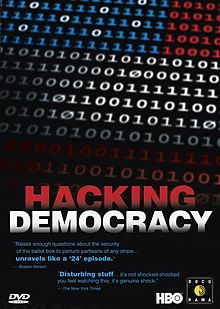Difference between revisions of "Hacking Democracy"
(Created page with "{{Infobox Film | name = Hacking Democracy | image = 250px|center | image_caption ...") |
(No difference)
|
Latest revision as of 23:23, 24 January 2015
| Hacking Democracy Poster | |
| Format | Video (TV) |
|---|---|
| Genre | Documentary |
| Origin | USA |
| Language | English |
| Release Date | November 2, 2006 |
| Running Time | 82 min |
| Production | |
| Created by | Simon Ardizzone, Russell Michaels |
| Directed by | Simon Ardizzone, Russell Michaels |
| Produced by | Simon Ardizzone, Russell Michaels, Robert Carrillo Cohen |
| Written by | NA |
| Screenplay by | NA |
| Distributed by | HBO |
| Narrated by | James Naughton |
| Starring | Bev Harris, Harri Hursti, Mark Radke, Ion Sancho, Andy Stephenson |
| Music by | Tuomas Kantelinen |
| Cinematography by | NA |
| Edited by | Sasha Olswang |
| Production Company | Public Interest Pictures, Teale-Edwards Productions |
| Location(s) | USA |
| Original Channel | HBO |
| Additional Information | |
| Based on | NA |
| Topics | Technology, Computers, Hacking |
| Follows | NA |
| Precedes | NA |
| Associated Video | NA |
| Website | hackingdemocracy.com |
Hacking Democracy is a 2006 documentary film broadcast on HBO and created by producer / directors Russell Michaels and Simon Ardizzone, producer Robert Carrillo Cohen and executive producers Sarah Teale & Sian Edwards.
Synopsis
Filmed over three years it documents American citizens investigating anomalies and irregularities with 'e-voting' (electronic voting) systems that occurred during the 2000 and 2004 elections in the U.S.A., especially in Volusia County, Florida. The film investigates the flawed integrity of electronic voting machines, particularly those made by Diebold Election Systems, and the film culminates dramatically in the on-camera hacking of the in-use / working Diebold election system in Leon County, Florida.
In 2007 Hacking Democracy was nominated for an Emmy award for Outstanding Investigative Journalism.
Demonstrated Flaws
The documentary follows Bev Harris and Kathleen Wynne, director and associate director for nonprofit election watchdog group Black Box Voting, as they attempt to discover the extent to which it would be possible to alter results on the electronic voting machines of Diebold Election Systems (now Premier Election Solutions). Andy Stephenson, an employee of Black Box Voting from July–December 2004, assisted with comparisons of audit documents in Volusia County and obtained a secret videotape of Harris interviewing a voting machine testing lab. Kathleen Wynne captured live video of Harris finding voting machine records in a Volusia County trash bag, and captured video of Cuyahoga County elections workers admitting that the initial 3% recount ballots had not been randomly selected during the 2004 presidential election. Harris and Wynne then embarked on a series of five voting machine hack tests with Dr. Herbert Hugh Thompson and Harri Hursti in 2005 and 2006. During the course of the documentary, multiple methods of tampering with the votes are shown.
The first is through editing the database file that contains the voting totals. This file is a standard Microsoft Access database, and can be opened by normal means outside of the encompassing voting program without a password. Some jurisdictions have disabled Microsoft Access, making it more difficult to alter the database, but this protection was shown to be bypassed by Dr. Herbert Hugh Thompson through a Visual Basic program which searched for a string of text and edited the file through external means. However, alterations of the results in either of these fashions would be caught if a vigilant elections official compared the results with voting machine tapes.
Another hacking technique was demonstrated through hacking the actual computer code used in the Diebold Accu-Vote memory cards. This method was discovered by Finnish computer security expert Harri Hursti and is known as "the Hursti Hack". In this hack, Harri Hursti rigged the Diebold optical scan voting system to make the wrong candidate win by adding negative (minus) votes to one race. This resulted in that race having votes literally subtracted from its vote total. These methods were tested by the Leon County Supervisor of Elections, Ion Sancho, on the actual Diebold optical scan voting system used by Tallahassee, Florida in all their prior elections. This method demonstrated, contrary to a previous Diebold statement, that a person attempting to rig the votes of a precinct would need access to only the memory card, not the optical scan voting system or tabulation software. This method, when cross-checked between the optical scan voting system and tabulation software, appears legitimate, and further produces a false zero-vote print-out to verify that the memory card has no votes inside it before voting begins. Following this historic hack Ion Sancho stated: "If I had not known what was behind this I would have certified this election as a true count of a vote."
Downloads
| Film | User | Format | Link | Notes |
|---|---|---|---|---|
| Hacking Democracy (2006) | NA | MP4 | Archive.org | |
| Hacking Democracy (2006) | NA | XviD | Archive.org |
